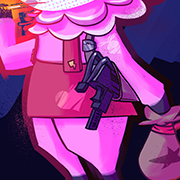|
Any goons here that work at Riot Games in Santa Monica, CA? I'm currently looking for project management positions and would like to get some more info if possible?
|
|
|
|

|
| # ? Jun 5, 2024 20:42 |
|
rndm posted:Any goons here that work at Riot Games in Santa Monica, CA? I'm a senior tech designer there, and I'd be happy to chat. Does anyone here have any experience with working at a studio in the super early stages, as in they just put in the paperwork to become a corporation? One of my friends is considering leaving their job to work at a new startup, and they're having some difficulty figuring out how to judge the opportunity of going vs leaving a stable job. Since Riot is my first gig I don't have a lot of advice to share; anything you guys can pass along or questions they should be sure to ask? Brackhar fucked around with this message at 21:24 on Mar 2, 2014 |
|
|
|
Brackhar posted:Does anyone here have any experience with working at a studio in the super early stages, as in they just put in the paperwork to become a corporation? One of my friends is considering leaving their job to work at a new startup, and they're having some difficulty figuring out how to judge the opportunity of going vs leaving a stable job. Since Riot is my first gig I don't have a lot of advice to share; anything you guys can pass along or questions they should be sure to ask? It's a startup, so it's best to assume it's going to fail out at some point and have a plan for dealing with that "when" it occurs, not "if". Even startups that are going super-well can run into problems-- I learned this personally last summer. The company I was working for had basically everything going for them... pretty much the whole company still ended up at a resume party because startups sometimes go like that(an essential round of funding didn't work out because the unavoidable timing didn't work out). basically, startups are awesome but understand the nature of the beast is to be unpredictable and most of them fail for one of a million reasons. Your friend should be asking questions about their business plans-- nothing real specific, but the point is to make sure they actually HAVE a plan for how the company is going to stay/become solvent. Where is operating money going to come from? How long is the current runway? What are they planning to do if the runway isn't long enough? If they don't want to answer these, I'd consider that level of opaque-ness a red flag. There is necessarily a lot of bidirectional trust involved in the startup equation. A significant amount of time in my interview last summer was discussing in a very serious and open fashion the ramp-up and plans for Holiday 2013-- because that was considered the big make-or-break for the startup in question. This is just my personal feelings based on my own experience. I'm sure other people have more/better to offer. Working for startups is a managed-risk situation, though.
|
|
|
|
Brackhar posted:I'm a senior tech designer there, and I'd be happy to chat. I started Inverted Axis and incorporated back in August and left a stable studio with a great gig to do so. We have 8 fulltime employees and 1 parttime. If they have questions they can e-mail me at patrick@invertedaxis.com
|
|
|
|
What's even required to start a startup anyways?
|
|
|
|
Revitalized posted:What's even required to start a startup anyways? I've wondered that myself. Is there a good high level resource for that somewhere?
|
|
|
|
Brackhar posted:Does anyone here have any experience with working at a studio in the super early stages, as in they just put in the paperwork to become a corporation? This is our first startup as founders but my second overall (I was the first non-founder employee at the previous one), so I can happily talk to your friend. Feel free to PM me info / question. Revitalized posted:What's even required to start a startup anyways? Required? Very little, but we were lazy and wanted all of our ducks in a row, so we just paid a startup-friendly lawfirm a nominal fee to deal with it all for us. It made navigating all the weird edge cases way easier than having to run the answers down ourselves (and risk missing some Big Important thing-- e.g we'd have totally screwed up our 83b elections!) and cost very little when looked at from the "time is money" point of view. We started as a Delaware S-corp and then converted over to a C-corp when we raised money. devilmouse fucked around with this message at 22:20 on Mar 2, 2014 |
|
|
|
devilmouse posted:(and risk missing some Big Important thing-- e.g we'd have totally screwed up our 83b elections!) https://www.youtube.com/watch?v=eosrujtjJHA&t=297s
|
|
|
|
I work for MegaShark at his startup, and I left Disney to go work for him, so add me to the list if they want to talk. One thing to keep in the back of your head is that stability at ANY dev at this point in the industry's history can be a facade. We discuss layoffs and studio closures CONSTANTLY in here. I'm not saying startups are better, just that big studios aren't inherently less risky. In fact, I prefer the transparency we have at InvertedAxis about the studio's finances and road map (and risks and challenges) to the strange need for big studios to wear fake smiles and give fake thumbs ups while nervously side-eyeing the other management.
|
|
|
|
Brackhar posted:Does anyone here have any experience with working at a studio in the super early stages, as in they just put in the paperwork to become a corporation? One of my friends is considering leaving their job to work at a new startup, and they're having some difficulty figuring out how to judge the opportunity of going vs leaving a stable job. Since Riot is my first gig I don't have a lot of advice to share; anything you guys can pass along or questions they should be sure to ask? Are they just going to be an employee at this startup? How well do they know the people starting the company? How much input will they have in the direction of things? Will they be provided with opportunities to advance their career, is management focused on producing work, or is it more likely your friend will end up creating tons of prototypes/concepts for vanity projects that never see the light of day and that they can never share with anyone. Basically, how serious is this startup and the people running it?
|
|
|
|
Brackhar posted:Does anyone here have any experience with working at a studio in the super early stages, as in they just put in the paperwork to become a corporation? ... but that's me, and how I do business. Working for Mega Shark's studio would be a whole other ball of wax, since he went the traditional employees / physical office route (whereas we're an all-digital studio of collaborators). At this size of studio, it's all down to the founder. Some are absolute bastards and will screw their contract people out of everything. It doesn't really matter what contracts are signed, either - contracts can be walked around by the monied party in a billion ways, usually. He should be asking himself if he trusts the founder above all else. Shalinor fucked around with this message at 23:39 on Mar 2, 2014 |
|
|
|
mutata posted:One thing to keep in the back of your head is that stability at ANY dev at this point in the industry's history can be a facade. mutata posted:the strange need for big studios to wear fake smiles and give fake thumbs ups while nervously side-eyeing the other management.
|
|
|
|
mutata posted:I work for MegaShark at his startup, and I left Disney to go work for him, so add me to the list if they want to talk. Yeah, I think for him a lot of the concern is the current stability of his current position vs the risk of doing his own thing. He's at a Blizzard-size company and senior enough that there's no real risk of him losing his position, while also being junior enough that there's room for him to grow there (albeit on a project he's not super into). How'd you make the call to leave a place like Disney and work at a startup, if you don't mind me asking? I imagine the circumstances could be a bit similar.
|
|
|
|
Brackhar posted:Yeah, I think for him a lot of the concern is the current stability of his current position vs the risk of doing his own thing. He's at a Blizzard-size company and senior enough that there's no real risk of him losing his position, while also being junior enough that there's room for him to grow there (albeit on a project he's not super into). How'd you make the call to leave a place like Disney and work at a startup, if you don't mind me asking? I imagine the circumstances could be a bit similar. For me, I was bored to tears of working on the same types of projects I had been doing for the previous 7 years. The previous startup I joined had a ~2 year runway so I knew there'd be at least that much security. These days we're pretty upfront with anyone we hire about our cash on hand and burn rate as well as "worst case scenarios" and their effect on the situation. It depends on way too many factors for your friend, including his own financial situation, his tolerance for risk, how much he likes what the new company is doing and its founders, and so on. Personally, I could never leave the weird wild world of startups, but if I found myself with 2 kids, a sick mother, and a mortgage, I might change my tune right quick.
|
|
|
|
Brackhar posted:Does anyone here have any experience with working at a studio in the super early stages, as in they just put in the paperwork to become a corporation? One of my friends is considering leaving their job to work at a new startup, and they're having some difficulty figuring out how to judge the opportunity of going vs leaving a stable job. Since Riot is my first gig I don't have a lot of advice to share; anything you guys can pass along or questions they should be sure to ask? I was the first employee at the company I'm at and the risk for me was definetly worth it. He should weight in how much he'd like working there vs the risk of everything imploding. I live in Uruguay, there aren't many companies here and all of them either do work for hire or olpc games. There was no way i'd pass the opportunity to work on an original game I really enjoyed even though I'm not a fan of the genre (the game is Kingdom Rush if you are wondering). I did know two out of the three founders from before and knew they were cool guys so that just made it easier.
|
|
|
|
OneEightHundred posted:Transparency has its drawbacks, the main one being the effect on employee morale. One thing that I've noticed through several layoffs/closures is that the work goes abruptly from diligently working to being either immediately laid off, or reassigned to work that's 100% about winding down, and AFAIK the reason for that is that the only way for the company to have a future is for people to act like it does, otherwise the doomsaying will sap productivity and become a self-fulfilling prophecy. This is true. Full transparency can be pretty distracting and dis-empowering. Almost everyone would choose more over less, but not everyone handles it well when given.
|
|
|
|
I am at a big studio which is also employee owned which is a pretty fantastic setup. The industry at large would be a more stable and lucrative place if more companies operated under that model, IMO.
|
|
|
|
DancingMachine posted:This is true. Full transparency can be pretty distracting and dis-empowering. Almost everyone would choose more over less, but not everyone handles it well when given. I know that nobody likes getting laid off without warning, but that begs the question of what they would do if they had warning. I think it's better for both the company and employee to handle that sort of thing with severance packages instead.
|
|
|
|
It's always fun casually checking a Studio's website for non-employment reasons, and finding out there's a job right up my alley. Now I just have to get it  ! !
|
|
|
|
Most startups are going to have a ways to go as far as getting their proper legal framework situated. Even funded ones are going to proceed slowly, adding contracts, policies, and documents as they need them rather than planning it all out in advance. Mostly though, this is an issue for the owners/officers/board, rather than employees/contractors. Legally, the main concern at the early stages is getting yourself set up to protect the founders (e.g. corporate liability shield) and getting yourself set up that you could potentially accept investment, sell the company, add or remove partners, etc. -- a focus oriented at the top. Whether the startup is stable and how healthy it is financially is an entirely different question, completely separate from the legal side. I'm happy to talk about the legal side more, if you'd like but I think Mega Shark, Shalinor, and other studio heads are going to be better resources for your friend. -e- Also, did any Riot goons work with someone named Ingrid? She was in Marketing I believe?
|
|
|
|
Transparency is a very good topic in terms of start-ups (and more established companies). Obviously we are a ways before we see whether Inverted Axis will be a successful, long-term company but here are my thoughts. The success of this business is predicated on the value of the employees. I work off of the idea that if I am the smartest person at my company, we are going to fail. This only touches on recruitment, once an employee starts I set expectations that they are adults and by communicating our company's goals and our stake in a product I am entrusting them with our success. I don't see keeping things from employees being beneficial, while I do see giving information to employees to be beneficial. It is also important to note that transparency can mean (or be perceived) as oversharing. Not everything is important for employees to know, I don't share things like monthly bills, the cost of Office 365 or Adobe Cloud because at the end of the day it's not something I see as necessary for them to know. My employees entrust me to make sure they get paid and that they have insurance for them and their families. It's my duty to make sure that I am doing everything in my power to take care of them because they are creating the product that pays our bills. I feel that a way to make my employees feel more comfortable is through transparency. Am I always 100% good at sharing everything? No, I work at it every day but I certainly try to make sure that we're all on the same page, day in and day out. The above is probably all more philosophical than anything but it's based off of the experiences I have and the team that I've built and I think it's one step towards building success.
|
|
|
|
Thanks for all of the advice so far dudes. For those of you who either started a company or were in at ground floor, how long did it take before you were able to get paid? My friend's opportunity would set him up with a decent ownership stake in the company and he'd be able to help set it's direction, but a decent amount of the work this year would be getting a direction and prototype up and running to then pitch for funding. He's fine with working without a paycheck for a bit until funding comes online (as would everyone at the studio), but I don't know how standard/rare it is for startups to begin without funding.
|
|
|
|
Brackhar posted:Thanks for all of the advice so far dudes. Our situation was a bit unique. I did leave my company without having an income guaranteed, however I was already in contract negotiations. I was without pay for about two months before everything was finalized. This is much different than most people as I almost immediately went into a publishing contract. I have a wife and five kids so leaving my great job without any idea of when the next paycheck would come was not an acceptable risk for us. In regards to not having funding and starting off, I would suggest building a staff (even small) and securing a space. Other publishers I have talked with were all looking for that stability before they would want to talk to you about making a game. Your first game may not allow you to keep the IP or have huge royalties but it would allow you to get the ball rolling.
|
|
|
|
OneEightHundred posted:It's all relative, but larger studios can generally survive product failures much more easily, and startup studios are affected by the same industry volatility that affects major studios on top of the volatility of being a startup. I wont go so far as to say I disagree here, but I will offer my own observations that I believe run counter to this. I had 2 internships before getting converted to a permanent position and at both internships I saw large (20+ people) layoffs. During these 2 internships I worked on teams of 6-10 people and every one of them had either a "I got laid off once" story or a "The company I worked for got shut down" story (or one of each) and they worked at companies of various sizes. Furthermore, I worked for Disney which has all of the money in the world and can absorb A LOT (see: John Carter of Mars, etc) but while I worked for Avalanche, I watched them close 4 or 5 of their 6 or 7 studios, some of which were 200+ studios like Junction Point. These are my observations. Beyond observations, when I started talking to colleagues about the Inverted Axis opportunity, and I mentioned instability in the list of startup concerns, almost everyone immediately stated "Well, I don't feel like there's a ton of stability HERE, and I work for x company." I think stability is just a general industry-wide concern. I think where there's a large company, there's a larger pressure to make larger games to make larger profits and it kind of evens out no matter what size company you work for. THAT SAID, the fact that a company has survived to make it to the 200+ size is much more indicative of it's abilities than any startup's sales pitch, so that's why I won't disagree with you. OneEightHundred posted:Transparency has its drawbacks, the main one being the effect on employee morale. One thing that I've noticed through several layoffs/closures is that the work goes abruptly from diligently working to being either immediately laid off, or reassigned to work that's 100% about winding down, and AFAIK the reason for that is that the only way for the company to have a future is for people to act like it does, otherwise the doomsaying will sap productivity and become a self-fulfilling prophecy. This makes sense, but I guess my comment about transparency is that I want it, so I'm more likely to seek out a company that offers it. Transparency, in my limited observations, should be a company culture thing; that is, a thing that your company decides how they want to approach it and then they hopefully attract employees who appreciate that aspect. Brackhar posted:Yeah, I think for him a lot of the concern is the current stability of his current position vs the risk of doing his own thing. He's at a Blizzard-size company and senior enough that there's no real risk of him losing his position, while also being junior enough that there's room for him to grow there (albeit on a project he's not super into). How'd you make the call to leave a place like Disney and work at a startup, if you don't mind me asking? I imagine the circumstances could be a bit similar. For me I had to determine what my immediate requirements were and what my future growth requirements were and then examine which situation addressed them better. My immediate requirements were rather simple: I needed -A wage that would allow me a decent quality of life for myself, my wife, and my 6-month-old son. -Insurance -Day-to-day job satisfaction (this is covered by the "What's an average day at work like?" question in the interview, as well as stuff like sick leave, vacation, what if my family has an emergency?, will I have the tools I need to work effectively, etc. the day-to-day stuff) My future growth requirements were more complex. I wanted to make art, but I wanted as much opportunity to learn as much as I can. I wanted to be able to make my own artistic decisions. I wanted to have the opportunity to grow in wage and position and responsibility. I wanted the freedom to explore and fail (within reason) so I can remain competitive among the industry at large. I wanted the possibility to affect the culture of a company in ways that I saw as positive. I wanted to have the flexibility and agility to respond to changing industry trends. I wanted something longer-term. When MegaShark contacted me, the way he described his business plan and what he had set up so far made a lot of sense to me. He wasn't a pie-in-the-sky "WE'LL MAKE IT ON OUR DREAMS!" type of startup, he had practical logistics in place and this satisfied my above immediate requirements. Beyond that, as we talked further about the company and where he wanted to take it, he made me much more optimistic that I could fulfill as many of my future growth needs as possible. I felt the potential was there for the future and the foundation was strong in the present. There are a TON of advantages to working for a company like Disney, but there are a lot of inherent limitations to the Disney machine that made me sad and less optimistic about my personal place there and what influence I could have in the end. Additionally, as I got to know a bit more about MegaShark personally, I found that we have a lot of core views and beliefs in common, and frankly, I liked that he has 5 kids. I saw him as a sensible, smart person who had set up the company in a smart way and he had 5 hungry mouths as motivation to not screw it all up. I say this not to embarrass MegaShark, but to point out that when considering a startup, the personalities and personal lives of your boss and coworkers take on a MUCH LARGER importance in your decision to work there or not. I hope that helps, and I hope I don't get yelled at tomorrow for sharing too much! Edit: I'll also add that my wife and I were both very positive on it from the beginning. If you personally believe in such things read that as me saying that our gut feelings were that it would be a good move and we both felt that way. In my opinion, that kind of instinctual stuff isn't to be underestimated if the facts look good too. mutata fucked around with this message at 05:34 on Mar 3, 2014 |
|
|
|
My $0.02, coming from having spent a couple decades riding a (software, but non-games) company from founding start up to it's eventual home as a tiny tiny piece of a big, big company, ; the startup days are obviously going to be touch and go, but I find the job stability in a huge company to be far less than that of the days of a post-startup, but still small company (20-100 people). I'd say, having seen essentially every company size, my favorite times were the 20-100 person company. Everyone knows each other, you have a real focus on a particular product, the manpower to execute on it (though always understaffed), and an income stream you understand and control. Before that, any single hour could spell destruction just because you're small, and your income stream is unsteady and uncertain, and you have no financial backstop; after that, there's too many people for it to be a monkey-tribe, and it becomes easier and easier for the people at the top to read everyone as an asset, instead of a human, and they do... Though owners that are shitheads will make any size company horrifying.
Unormal fucked around with this message at 05:05 on Mar 3, 2014 |
|
|
|
OneEightHundred posted:It's all relative, but larger studios can generally survive product failures much more easily Yeah, I'm going to have to disagree here as well. In my short time in the industry, I've been through two (well, three, sorta) big, well established AAA companies. At THQ Montreal, we pretty much had the dream team that gave birth to Assassin's Creed. Our new IP was ambitious and probably would have actually managed to bring something new to the scene. THQ was willing to deal with our team of rockstars, including the risk, even though we had to rescope from current gen to next gen while we were working on it. Eventually, however, the complete stupidity of the uDraw port to 360/PS3 sunk the company (along with Dark Millenium Online, according to Jason Rubin). Then came Ubisoft, if anyone is able to weather new IP failures, it would be them. However, after fully supporting us to keep on working on the 1666 IP for a while, they turned around and canned the project. Maybe because they are already risking big with Watch Dogs, maybe because they still hate Patrice Desilets's guts, maybe because they though the IP would compete with one of their own, but either way it literally came out of nowhere. Finally, at Eidos Montreal, I was working on another new IP. It was great, it was something no one else has done in Montreal, would open up new avenues and allow mobility within the studio between the Thief and Deus Ex franchises. But The project got rescoped, then canned altogether, even though the studio head was fully behind it. It is still not clear, but it seems the order came from higher up. Long story short, though the IPs and teams I've worked with across these studios were absolutely thrilling, they were anything but stable. That's a risk that comes with new IPs, but larger studios are decreasingly willing to invest in those. I've been looking for a change of pace from AAA after that and ended up at Compulsion by some fluke, when I blindly reached out to some of the better known indies in Montreal. It turns out that the studio head at Compulsion had contracted with THQ when I was working on Darksiders II WiiU there, and had been impressed enough with my work to offer me to join their small team. Which leads me to the actual relevant part of my post regarding working at indie startups. Compulsion is a bit past the startup phase, having recently shipped Contrast. A lot has already been said, so I'll stick to what is somewhat unique to our situation. Our studio head refuses to relinquish creative control to a publisher. Which means that our funding apart from sales has mostly come from funding programs (the CMF has funded Contrast, Papo & Yo, WARP, Outlast, Tiny Brains, among other Montreal indie works), the PSN+ PS4 launch deal and mostly contracting. As in, the whole company stopped work and went contracting. This approach means that the company doesn't have any debt and our outlook is positive. But we all know we're dependent on securing funding again for our next project, likely having to contract again if that falls through. When I talked with our boss before accepting to join the team, he was very open about all that I've mentioned and the outlook of the company. Everyone here knows that our job stability is not guaranteed, but it is not affecting the team morale. Instead, we simply retain a realistic outlook instead of relying on the false security of a big company environment. The greater creative liberty afforded to us by our small size and our studio head's management makes it all worthwhile.
|
|
|
|
Brackhar posted:Thanks for all of the advice so far dudes. At the first one, since i was the first employee, I was getting paid a real salary from day 1. For the second, as a founder, we went without paychecks from November-April as we were trying to wrangle funding. If you're friend is not being paid, this changes things pretty drastically and he should make sure what he thinks of as "decent ownership" is actually pretty significant. Depending on his role, how many people there are, how many shares are outstanding, etc, he might be getting super screwed over here. If there's a group of people doing this unpaid, they really need to have their paperwork in line not to get hosed down the road. Usually founders will go without pay and scrape SOMETHING for their employees (via seed/angel, personal savings, etc). We were paying friends of ours who offered help early on just because we didn't want to feel like 1) we were taking advantage of their friendship and 2) making sure THEY felt like it was Real Work and not just us screwing around (so deadlines were important and so on).
|
|
|
|
Just to let people know... There are jobs going at TT Fusion in the Northwest UK. A bunch of people split off to do Star Citizen and there's a few seats that need filling (at both places, I believe.) Most of the positions are still being advertised internally but they should go public properly soon. I got my name in the credits of the Lego Movie game and I'm pretty excited about that. I have an opportunity to get my foot in the door so I'm working hard on a submission I've been asked for. Feels good to have my name in the credits of a game before the close of my first year at university. 
|
|
|
|
devilmouse posted:At the first one, since i was the first employee, I was getting paid a real salary from day 1. In his case he's being offered to come on as the lead designer for the team, and he said that no-one attached to the company was expecting to be able to draw a paycheck for six-ish months until funding is secured based on a prototype translating into either a publishing or kickstarter deal. He didn't share what ownership level he was offered in the company, so I don't have much info there.
|
|
|
|
Brackhar posted:In his case he's being offered to come on as the lead designer for the team, and he said that no-one attached to the company was expecting to be able to draw a paycheck for six-ish months until funding is secured based on a prototype translating into either a publishing or kickstarter deal. He didn't share what ownership level he was offered in the company, so I don't have much info there. I would be extremely skeptical then. The amount of money even big Kickstarters are getting are really not that big in terms of running a company. If that is their big plan then your buddy is almost certainly better off waiting for another opportunity. Obviously the details matter here so if he wants more info he could certainly contact me or anyone else who has offered.
|
|
|
|
Yeah, unless there's some big piece that I'm missing here ("The founder is actually Cliffy B!!!!"), I'd be pretty dubious of this plan.
|
|
|
|
devilmouse posted:Yeah, unless there's some big piece that I'm missing here ("The founder is actually Cliffy B!!!!"), I'd be pretty dubious of this plan.
|
|
|
|
Brackhar posted:and he said that no-one attached to the company was expecting to be able to draw a paycheck for six-ish months until funding is secured Hahahahaha
|
|
|
|
Brackhar posted:In his case he's being offered to come on as the lead designer for the team, and he said that no-one attached to the company was expecting to be able to draw a paycheck for six-ish months Yeah no.
|
|
|
|
Brackhar posted:In his case he's being offered to come on as the lead designer for the team, and he said that no-one attached to the company was expecting to be able to draw a paycheck for six-ish months until funding is secured based on a prototype translating into either a publishing or kickstarter deal. He didn't share what ownership level he was offered in the company, so I don't have much info there. If the people are quality, and he can live for 6+ months with no paycheck, and feels it is worth gambling on a publisher deal (not Kickstarter, Kickstarter doesn't give you anything approaching reasonable funding unless you're a name from the 90s, and even then it gives you a very easily spent chunk of change), then he could go for it. But if any of the people aren't proven to him personally, or he can't afford living with no money, or the company is naively targeting kickstarter in lieu of Real Money Publishing, he should back the gently caress out. Honestly, the fact that he's asking a friend if he should take it on without having told you that the people are quality, that he can afford the costs, etc, means he probably hasn't done the hard thinking on his own yet. I think the answer will become quickly clear once he realizes that one of those questions (almost definitely the people one) is going to be a deal breaker. Even with all the right pieces it's going to be a long shot gamble - if he doesn't have all the right pieces it's going to become a completely lunatic decision. I have a handful of people I would gladly work with in a heartbeat, and if those people asked me, I'd still have to weigh the financial situation and the targets before I'd sign on board. If I didn't know the people personally I wouldn't even bother considering it.
|
|
|
|
Look at it another way. How much will it cost him to not draw a paycheck those 6 months? $30,000? $40,000? First, does he have $40,000 (probably more like $60+) stashed aside ALREADY that he can live off of? If not, how does he plan to put food on the table? Certainly not working part-time on something else. Would he pay $40,000 for the privilege of working there? Because that's what he is doing with the opportunity cost of not drawing a salary for 6-months. Ultimately, if you can't say that the experience, and the equity are worth that kind of tradeoff, it's not worth it.
|
|
|
|
Leif. posted:Would he pay $40,000 for the privilege of working there? This is a really good way to put it. Thief just let go of a bunch of people - seems like not the full studio and more like just flushing people they probably brought on to finish the game: http://kotaku.com/big-layoffs-at-thief-developer-eidos-montreal-1536315021
|
|
|
|
27 out of 500 isn't bad compared to what's been happening lately. Still lovely but it's definitely not as drastic as the other layoffs/shutdowns have been. Seems like they're making a good effort to reposition them somewhere else at the company or at another studio.
|
|
|
|
|
There aren't 500 people at Eidos, closer to 300. Probably less than that, given how many of my former colleagues have quit after they canned our project. Now if they hadn't canned that project, they'd have something to put all their employees to work on!  Edit:  Exciting times, indeed. 
Jan fucked around with this message at 01:06 on Mar 5, 2014 |
|
|
|

|
| # ? Jun 5, 2024 20:42 |
|
Scuttlebutt has Naughty Dog writer Amy Hennig being forced out of her job. Weird.
|
|
|






























 if
if 